英文成语故事附翻译三篇
英语成语故事带翻译200字
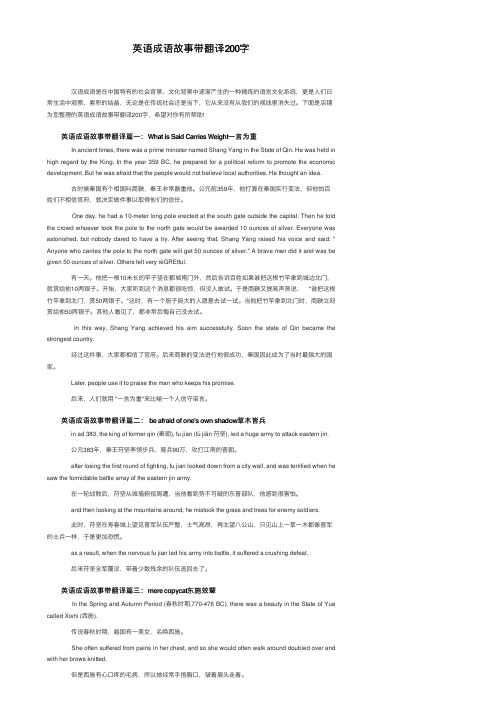
英语成语故事带翻译200字 汉语成语是在中国特有的社会背景、⽂化背景中逐渐产⽣的⼀种精练的语⾔⽂化系统,更是⼈们⽇常⽣活中观察、累积的结晶,⽆论是在传统社会还是当下,它从来没有从我们的视线⾥消失过。
下⾯是店铺为您整理的英语成语故事带翻译200字,希望对你有所帮助! 英语成语故事带翻译篇⼀:What is Said Carries Weight⼀⾔为重 In ancient times, there was a prime minister named Shang Yang in the State of Qin. He was held in high regard by the King. In the year 359 BC, he prepared for a political reform to promote the economic development. But he was afraid that the people would not believe local authorities. He thought an idea. 古时候秦国有个相国叫商鞅,秦王⾮常器重他。
公元前359年,他打算在秦国实⾏变法,但他怕百姓们不相信官府,就决定做件事以取得他们的信任。
One day, he had a 10-meter long pole erected at the south gate outside the capital. Then he told the crowd whoever took the pole to the north gate would be awarded 10 ounces of silver. Everyone was astonished, but nobody dared to have a try. After seeing that, Shang Yang raised his voice and said: " Anyone who carries the pole to the north gate will get 50 ounces of silver." A brave man did it and was be given 50 ounces of silver. Others felt very reGREtful. 有⼀天。
英语成语简短小故事带翻译
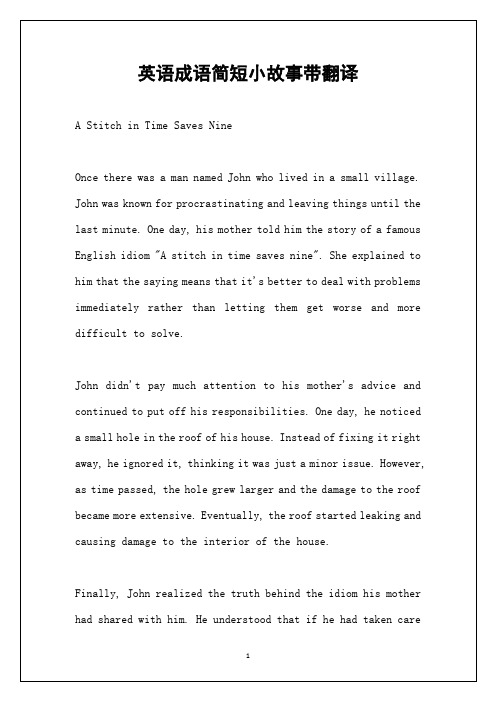
最后,约翰意识到了母亲与他分享的谚语背后的道理。他明白,如果当他第一次注意到小洞时就进行修补,他就可以避免后来处理更大问题的麻烦。从那天起,约翰吸取了教训,开始一旦问题出现就及时解决。
The moral of the story is that addressing problems promptly can prevent them from escalating into much larger and more difficult problems. This idiom can be applied to various aspects of life, such as work, relationships, and personal development. It teaches us the importance of being proactive and taking action to prevent potential problems from worsening.
John didn't pay much attention to his mother's advice and continued to put off his responsibilities. One day, he noticed a small hole in the roof of his house. Instead of fixing it right away, he ignored it, thinking it was just a minor issue. However, as time passed, the hole grew larger and the damage to the roof became more extensive. Eventually, the roof started leaking and causing damage to the interior of the house.
中国成语英文故事带中文翻译
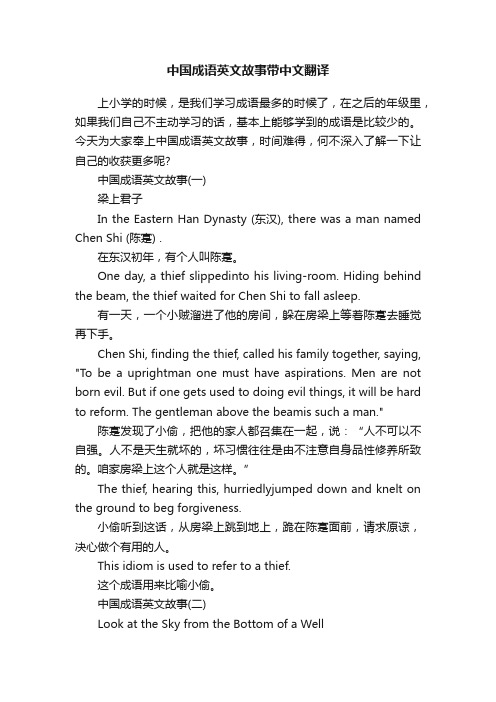
中国成语英文故事带中文翻译上小学的时候,是我们学习成语最多的时候了,在之后的年级里,如果我们自己不主动学习的话,基本上能够学到的成语是比较少的。
今天为大家奉上中国成语英文故事,时间难得,何不深入了解一下让自己的收获更多呢?中国成语英文故事(一)梁上君子In the Eastern Han Dynasty (东汉), there was a man named Chen Shi (陈寔) .在东汉初年,有个人叫陈寔。
One day, a thief slippedinto his living-room. Hiding behind the beam, the thief waited for Chen Shi to fall asleep.有一天,一个小贼溜进了他的房间,躲在房梁上等着陈寔去睡觉再下手。
Chen Shi, finding the thief, called his family together, saying, "To be a uprightman one must have aspirations. Men are not born evil. But if one gets used to doing evil things, it will be hard to reform. The gentleman above the beamis such a man."陈寔发现了小偷,把他的家人都召集在一起,说:“人不可以不自强。
人不是天生就坏的,坏习惯往往是由不注意自身品性修养所致的。
咱家房梁上这个人就是这样。
”The thief, hearing this, hurriedlyjumped down and knelt on the ground to beg forgiveness.小偷听到这话,从房梁上跳到地上,跪在陈寔面前,请求原谅,决心做个有用的人。
成语故事大全英文版
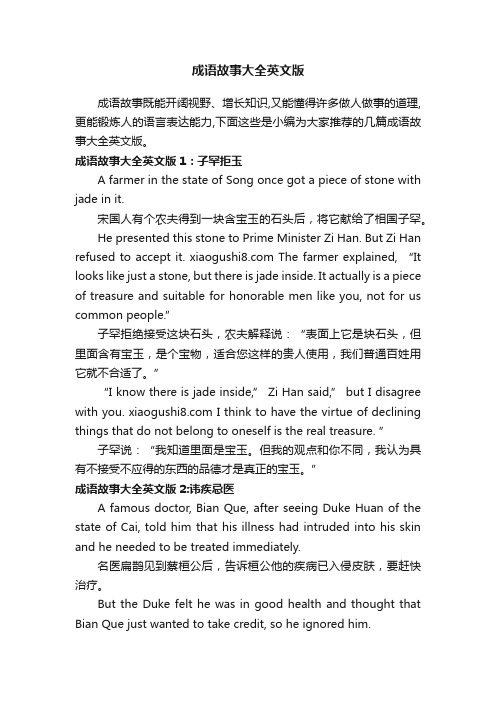
成语故事大全英文版成语故事既能开阔视野、增长知识,又能懂得许多做人做事的道理,更能锻炼人的语言表达能力,下面这些是小编为大家推荐的几篇成语故事大全英文版。
成语故事大全英文版1:子罕拒玉A farmer in the state of Song once got a piece of stone with jade in it.宋国人有个农夫得到一块含宝玉的石头后,将它献给了相国子罕。
He presented this stone to Prime Minister Zi Han. But Zi Han refused to accept it. The farmer explained, “It looks like just a stone, but there is jade inside. It actually is a piece of treasure and suitable for honorable men like you, not for us common people.”子罕拒绝接受这块石头,农夫解释说:“表面上它是块石头,但里面含有宝玉,是个宝物,适合您这样的贵人使用,我们普通百姓用它就不合适了。
”“I know there is jade inside,” Zi Han said,” but I disagree with you. I think to have the virtue of declining things that do not belong to oneself is the real treasure. ”子罕说:“我知道里面是宝玉。
但我的观点和你不同,我认为具有不接受不应得的东西的品德才是真正的宝玉。
”成语故事大全英文版2:讳疾忌医A famous doctor, Bian Que, after seeing Duke Huan of the state of Cai, told him that his illness had intruded into his skin and he needed to be treated immediately.名医扁鹊见到蔡桓公后,告诉桓公他的疾病已入侵皮肤,要赶快治疗。
英文版中国成语故事
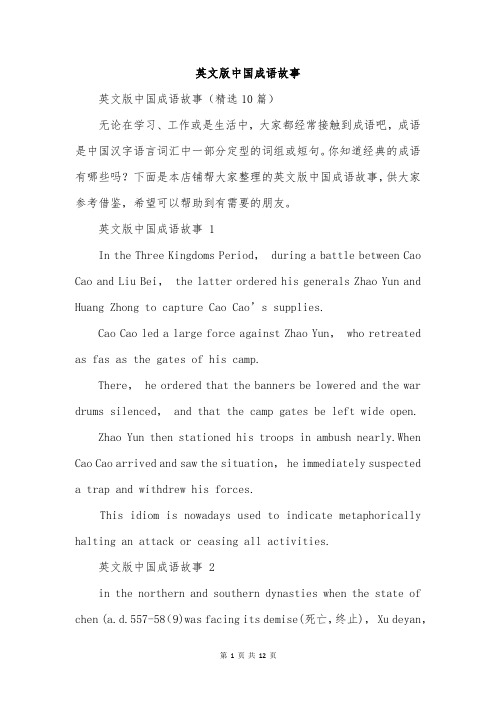
英文版中国成语故事英文版中国成语故事(精选10篇)无论在学习、工作或是生活中,大家都经常接触到成语吧,成语是中国汉字语言词汇中一部分定型的词组或短句。
你知道经典的成语有哪些吗?下面是本店铺帮大家整理的英文版中国成语故事,供大家参考借鉴,希望可以帮助到有需要的朋友。
英文版中国成语故事 1In the Three Kingdoms Period, during a battle between Cao Cao and Liu Bei, the latter ordered his generals Zhao Yun and Huang Zhong to capture Cao Cao’s supplies.Cao Cao led a large force against Zhao Yun, who retreated as fas as the gates of his camp.There, he ordered that the banners be lowered and the war drums silenced, and that the camp gates be left wide open.Zhao Yun then stationed his troops in ambush nearly.When Cao Cao arrived and saw the situation, he immediately suspected a trap and withdrew his forces.This idiom is nowadays used to indicate metaphorically halting an attack or ceasing all activities.英文版中国成语故事 2in the northern and southern dynasties when the state of chen (a.d.557-58(9)was facing its demise(死亡,终止), Xu deyan,husband of the princess, broke a bronze mirror into halves.each of them kept a half as tokens in case they were separated.soon afterwards, they did lose touch with each other,but the two halves of the mirror enabled them to be reunited.this idiom is used to refer to the reunion of a couple after they lose touch or break up.英文版中国成语故事 3during the warring states period (475-221bc), the king of the state of qi was very fond of listening to yu ensembles.he often got together 300 yu players to form a grand music.the king treated his musician very well.a man named nanguo heard about that and he managed to become a member of the band,even though he wan not good at playing the instrument at all.whenever the band played for the king, nanguo just stood in the line and pretended to play.nobody realized he was making no sound at all.as a result, he enjoyed his treatment just as the other musician did.when the king died, his son became the new ruler who also liked the music played on the yu.however,he preferred solos so that he ordered the musicians to play the yu one by one.therefore, nanguo had to run out of the palace.英文版中国成语故事 4At the end of the Qin Dynasty(221-206 B.C.)the State of Chu and the State of Han fought for control for the country.Xiang Yu, the king of Chu, was besieged(包围) at a place called GaiXia by the Han army led by Liu Bang.Xiang Yu was in a desperate situation,with little food and only a few soliders.At night, the surrounding Han troops started to sing Chu folk songs.Xiang Yu was very surprised at this,and said:"Has Liu Bang occupied the whole of Chu? How can he have drafted so many Chu people into his army?" Then he fled together with the remainder of his forces.This idiom is used metaphorically to mean to be in a helpless and critical situation, surrounded by the enemy on all sides.项羽和刘邦原来约定以鸿沟(在今河南荣县境贾鲁河)东西边作为界限,互不侵犯。
简短英语成语故事带翻译

简短英语成语故事带翻译想要学好英语,一定要懂得学习方法。
有趣的学习方法能让你的英语水平提升得更快,小编在此献上英语故事,希望对你有所帮助。
成语寓言故事:The Clever Way to Get Rich致富妙法There lived a rich man named Guo in the State of Qi and a poor man named Xiang in the State of Song.齐国有个姓“国”的富人,宋国有个姓“向”的穷人。
The poor man came to the State of Qi to visit the rich man, and asked him about the way to get rich.穷人到齐国去拜访那位富人,向他请教致富的方法。
The rich man in the State of Qi told him:齐国富人告诉他:"I was also very poor before, but now I am quite well-off. The only reason is that I can steal and rob. But it is very painstaking. By stealing and robbing, I could make a living in the first year, and in the second year I had more than enough to eat and wear. In the third year, my family's storehouse was truly filled with grain and millet."“我原来也很贫穷,可是现在日子过得很好。
原因只是我会偷、会抢罢了。
不过太辛苦了。
我偷呀抢呀,第一年生活就够维持了,第二年就已经吃不完穿不完了,第三年我家里真是粮满囤、谷满仓。
小学生英语成语故事带翻译
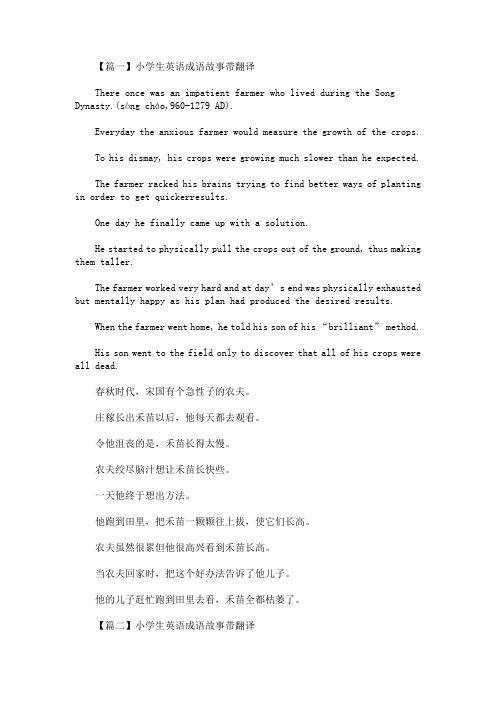
【篇一】小学生英语成语故事带翻译There once was an impatient farmer who lived during the Song Dynasty.(sòng cháo,960-1279 AD).Everyday the anxious farmer would measure the growth of the crops.To his dismay, his crops were growing much slower than he expected.The farmer racked his brains trying to find better ways of planting in order to get quickerresults.One day he finally came up with a solution.He started to physically pull the crops out of the ground, thus making them taller.The farmer work ed very hard and at day’s end was physically exhausted but mentally happy as his plan had produced the desired results.When the farmer went home, he told his son of his “brilliant” method.His son went to the field only to discover that all of his crops were all dead.春秋时代,宋国有个急性子的农夫。
庄稼长出禾苗以后,他每天都去观看。
令他沮丧的是,禾苗长得太慢。
农夫绞尽脑汁想让禾苗长快些。
英语成语故事及翻译三篇

【导语】孩⼦们学习成语故事,感受故事中的趣味,更从故事中,学习到很多为⼈处世的道理。
下⾯是分享的英语成语故事及翻译三篇。
欢迎阅读参考! 【后来居上】 Ji Anlived at the time of Emperor Wudi of the Western Han Dynasty (206 B.C.-A.D.24). He was respected for being upright and just and for daring to speak the truth. He did not bother about amall matters in personal behaviour and in being an official. He was particular about actual effects and ,although he did not cause a stir ,he could keep the prefecture he governed in perfect order. Because of this. the imperial court transferred him to the central government from being the perfect of the Donghai Prefecture to being a commander in charge of the appointment and dismissal of the local officals. 汲黯是西汉武帝时代⼈,以刚直正义、敢讲真话⽽受⼈尊重。
他为⼈和做官都不拘⼩节,讲求实效。
虽然表⾯上不那么轰轰烈烈,却能把⼀个郡治理得井井有条,因此,朝廷把他从东海太守调到朝廷当主爵都尉——⼀种主管地⽅吏任免的官职。
Once,Emperor Wudi said that he would implement the policy of benevolence and justice of Confucianism and would do good turns to the people.Emperor Wudi Had hardly finished his remards when Ji An said that there was no need for the emperor to say so.Why should the emperor bother,Ji An said, about pretending to implement the policy of benevolence and justice since he was so greedy and avaricious within himself? This choked the emperor off. The emperor suddenly Changed his countenance and declared the meeting over. All the civilian and military officers at court were breathless with anxiety for fear that Ji An might bring disaster upon himself because of this. After returning, Emperor Wudi said to the people around him that Ji An was a little too rude and too straightforward. 有⼀次,汉武帝说要实⾏儒家的仁义之政,为⽼百姓办好事了。
英语成语故事带翻译_成语故事大全

英语成语故事带翻译是语言外事实的一种反映形式,通过具体的表达抽象的,通过可感觉、可触摸的表达无形的。
下面是小编为您整理的成语故事带翻译,希望对你有所帮助!英语成语故事带翻译篇一: within an ace of winning功亏一篑Once a man planned to build a terrace.古时,有一个人要筑一座九仞(八尺=一仞)高的山。
He worked very hard and spent a lot of time digging and carrying earth.他十分努力的建造这座山,并且花了很多挖土、搬运泥土。
When the mound was almost completed and only one more basket of earth was needed, the man gave up.终于当山快要建成的时候,几乎只差最后一篮子的泥土就行了的时候,他放弃了。
The terrace was never completed.这座山便永远无法完工。
This idiom means to fail to succeed for lack of final effort.这个典故用以形容“离只有一步之遥,但最终失败告终”的意思。
英语成语故事带翻译篇二:a drop in the bucket九牛一毛li ling was a great general during the time of emperor han wu-di (hàn wǔ dì汉武帝). he was a very good fighter, and he won every battle.西汉时代有个很有名的大将军名叫李陵,他骁勇善战,百战百赢。
one time, however, li ling's troops were so hopelessly outnumbered by the huns that although they fought bravely, the whole army was soon taken captive.有一次,虽然李陵的军队奋勇杀敌,因为兵力不足而战败投降。
经典成语故事英文版简短【五篇】

【导语】成语是历史的积淀,每⼀个成语的背后都有⼀个含义深远的故事。
下⾯是⽆忧考分享的经典成语故事英⽂版简短【五篇】。
欢迎阅读参考!【篇⼀】经典成语故事英⽂版简短 The Mantis Tries to Stop the Chariot蛙臂挡车 One day, Zhuang Gong, King of the State of Qi, went out in a chariot to hunt. ⼀天,齐庄公乘车外出打猎。
On the way, he saw a small insect raise both its arms, trying to stop the wheels of the chariot. Zhuang Gong of Qi was curious and asked the driver: 路上,他看见⼀只⼩⾍举起双臂,想阻挡车轮前进。
齐庄公很好奇,就问车夫: "What kind of insect is it?" “这是什么⾍⼦?” "It is a mantis," the driver replied promptly. "This kind of insect only knows how to advance but not retreat, blindly underrating its enemies and overrating its own abilities." 车夫连忙回答:“这是蝗螂。
这种⾍⼦只知前进,不知后退,盲⽬轻敌,不⾃量⼒。
” Hearing the driver's reply, Zhuang Gong smiled to himself and remained silent. 听了车夫的回答,庄公暗⾃发笑,默默⽆语。
【篇⼆】经典成语故事英⽂版简短 Yang Bu Beats the Dog杨布打狗 Yang Zhu had a younger brother named Yang Bu. 杨朱有个弟弟叫杨布。
英文成语故事(通用8篇)

英文成语故事英文成语故事(通用8篇)成语故事是我国历史的一部分,成语是历史的积淀,每一个成语的背后都有一个含义深远的故事,是我国几千年以来人民智慧的结晶。
其特点是深刻隽永,言简意赅。
下面是小编给大家带来英文成语故事,希望对大家有帮助!英文成语故事篇1In the spring and autumn period, a man in the state of song raised monkeys. The monkeys could understand what he said.As the man became poor, he wanted to reduce the monkeys' food. He first suggested that he give them three acorns(橡子) in the morning and four acorns in the evening.Thereupon, the monkeys protested angrily. Then their owner said, "how about four in the morning and three in the evening?" The monkeys were satisfied with that.This idiom originally meant to befool others with tricks. later it is used to mean to keep changing one's mind.英文成语故事篇2In the Warring States Period, a man in the state of Chu was offering a sacrifice(祭品) to his ancestors. After the ceremony, the man gave a beaker of wine to his servants.The servants thought that there was not enought wine for all of them, and decided to each draw a picture of snake; the one who finished the picture first would get the wine.One of them drew very rapidly. Seeing that the others were still busy drawing, he added feet to the snake.At this moment, another man finished, snatched the beaker(烧杯,大口杯) and drank the wine, saying,"A snake doesn't have feet. How can you add feet to a snake?"This idiom refers to ruining a venture by doing unnecessary and surplus things.英文成语故事篇3In the Spring and Autumn Period, a farmer in the State of Song was one day working in the fields when he saw a rabbit bump into a tree stump(树桩) accidentally and break its neck.The farmer took the rabbit home, and cooked himself a delicious meal.That night he thought, 'I needn't work so hard. All I have to do is wait for a rabbit each day by the stump.'So from then on he gave up farming, and simply sat by the stump waiting for rabbits to come and run into it.This idiom satirizes(讽刺,挖苦) those who just wait for a stroke of luck, rather than making efforts to obtain what they need.英文成语故事篇4Near China's northern borders lived a man well versed in the practices of Taoism. His horse, for no reason at all, got into the territory of the northern tribes. Everyone commiserated with him."Perhaps this will soon turn out to be a blessing," said his father.After a few months, his animal came back, leading a fine horse from the north. Everyone congratulated him."Perhaps this will soon turn out to be a cause of misfortune," said his father.Since he was well-off and kept good horses his son became fond of riding and eventually broke his thigh bone falling from a horse. Everyone commiserated with him."Perhaps this will soon turn out to be a blessing," said his father.One year later, the northern tribes started a big invasion of the border regions. All able-bodied young men took up arms and fought against the invaders, and as a result, around the border nine out of ten men died. This man's son did not join in the fighting because he was crippled and so both the boy and his father survived.战国时期,靠近北部边城,住着一个老人,名叫塞翁。
英语成语故事精选及翻译五篇
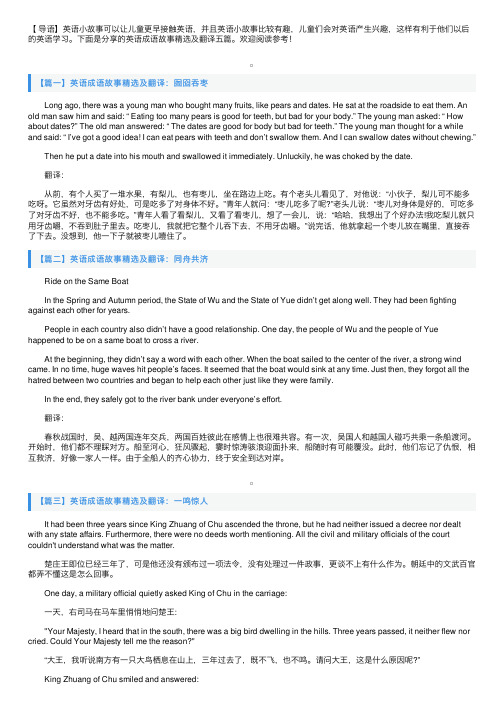
【导语】英语⼩故事可以让⼉童更早接触英语,并且英语⼩故事⽐较有趣,⼉童们会对英语产⽣兴趣,这样有利于他们以后的英语学习。
下⾯是分享的英语成语故事精选及翻译五篇。
欢迎阅读参考!【篇⼀】英语成语故事精选及翻译:囫囵吞枣 Long ago, there was a young man who bought many fruits, like pears and dates. He sat at the roadside to eat them. An old man saw him and said: “ Eating too many pears is good for teeth, but bad for your body.” The young man asked: “ How about dates?” The old man answered: “ The dates are good for body but bad for teeth.” The young man thought for a while and said: “ I’ve got a good idea! I can eat pears with teeth and don’t swallow them. And I can swallow dates without chewing.” Then he put a date into his mouth and swallowed it immediately. Unluckily, he was choked by the date. 翻译: 从前,有个⼈买了⼀堆⽔果,有梨⼉,也有枣⼉,坐在路边上吃。
有个⽼头⼉看见了,对他说:“⼩伙⼦,梨⼉可不能多吃呀。
它虽然对⽛齿有好处,可是吃多了对⾝体不好。
”青年⼈就问:“枣⼉吃多了呢?”⽼头⼉说:“枣⼉对⾝体是好的,可吃多了对⽛齿不好,也不能多吃。
简短的英语成语故事三篇
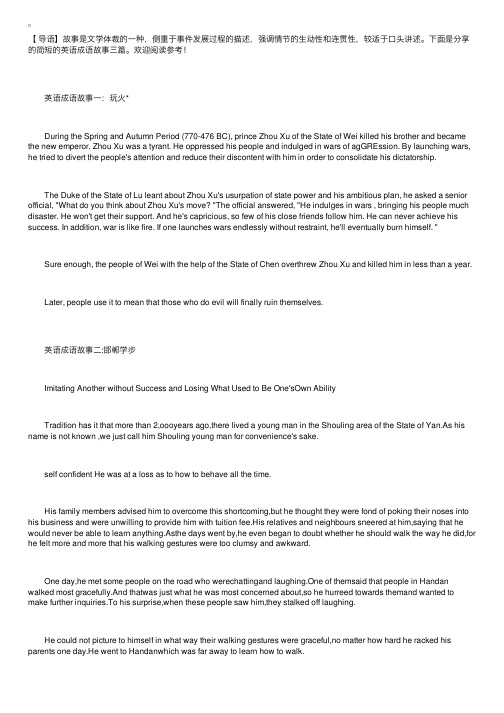
【导语】故事是⽂学体裁的⼀种,侧重于事件发展过程的描述,强调情节的⽣动性和连贯性,较适于⼝头讲述。
下⾯是分享的简短的英语成语故事三篇。
欢迎阅读参考! 英语成语故事⼀:玩⽕* During the Spring and Autumn Period (770-476 BC), prince Zhou Xu of the State of Wei killed his brother and became the new emperor. Zhou Xu was a tyrant. He oppressed his people and indulged in wars of agGREssion. By launching wars, he tried to divert the people's attention and reduce their discontent with him in order to consolidate his dictatorship. The Duke of the State of Lu leant about Zhou Xu's usurpation of state power and his ambitious plan, he asked a senior official, "What do you think about Zhou Xu's move? "The official answered, "He indulges in wars , bringing his people much disaster. He won't get their support. And he's capricious, so few of his close friends follow him. He can never achieve his success. In addition, war is like fire. If one launches wars endlessly without restraint, he'll eventually burn himself. " Sure enough, the people of Wei with the help of the State of Chen overthrew Zhou Xu and killed him in less than a year. Later, people use it to mean that those who do evil will finally ruin themselves. 英语成语故事⼆:邯郸学步 Imitating Another without Success and Losing What Used to Be One'sOwn Ability Tradition has it that more than 2,oooyears ago,there lived a young man in the Shouling area of the State of Yan.As his name is not known ,we just call him Shouling young man for convenience's sake. self confident He was at a loss as to how to behave all the time. His family members advised him to overcome this shortcoming,but he thought they were fond of poking their noses into his business and were unwilling to provide him with tuition fee.His relatives and neighbours sneered at him,saying that he would never be able to learn anything.Asthe days went by,he even began to doubt whether he should walk the way he did,for he felt more and more that his walking gestures were too clumsy and awkward. One day,he met some people on the road who werechattingand laughing.One of themsaid that people in Handan walked most gracefully.And thatwas just what he was most concerned about,so he hurreed towards themand wanted to make further inquiries.To his surprise,when these people saw him,they stalked off laughing. He could not picture to himself in what way their walking gestures were graceful,no matter how hard he racked his parents one day.He went to Handanwhich was far away to learn how to walk. As soon as he arrived in Handan,he was dazzled to find that everything was novel.He learned from the children there how to walk,because he thought that the children's walking gestures were lively and pleasing to the eye.He learnd from the old people there how to walk,because he thought the old people's walking gestures were steady .He learnd from the women there how to walk,because he thought the women' swaying walking gestures were beautiful.That being the case with him ,in less than half a month he even forgot how to walk.As he had already used up his traveling expenses,he had to crawl back home. Thisstory come from the article"Autumn Water"in The Works of Xhuang Zi(Zhuang Zi was a famous ancient Chinese philosopher of about 300B.c.).Later the set phrase"initating another without success and losing what used to be one's own ability"is used to refer to acts of copying others mechanisally in disregard of specififc conditions. 英语成语故事三:塞翁失马 Near China's northern borders lived a man well versed in the practices of Taoism. His horse, for no reason at all, got into the territory of the northern tribes. Everyone commiserated with him. "Perhaps this will soon turn out to be a blessing," said his father. After a few months, his animal came back, leading a fine horse from the north. Everyone congratulated him. "Perhaps this will soon turn out to be a cause of misfortune," said his father. Since he was well-off and kept good horses his son became fond of riding and eventually broke his thigh bone falling from a horse. Everyone commiserated with him. "Perhaps this will soon turn out to be a blessing," said his father. One year later, the northern tribes started a big invasion of the border regions. All able-bodied young men took up arms and fought against the invaders, and as a result, around the border nine out of ten men died. This man's son did not join in the fighting because he was crippled and so both the boy and his father survived.。
中英文成语故事精选三篇
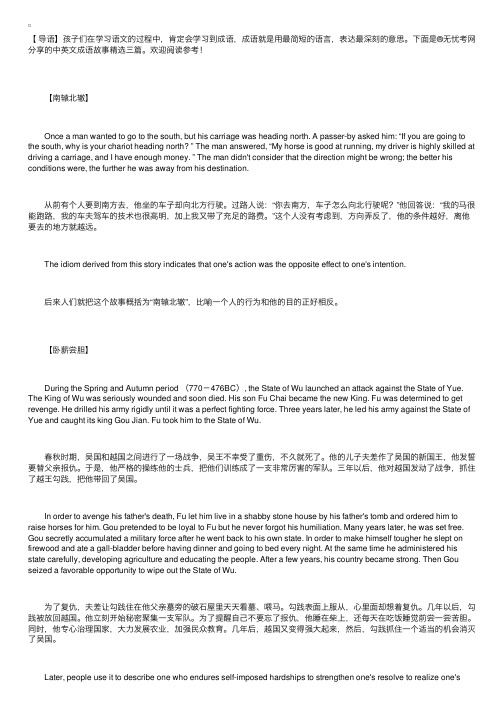
【导语】孩⼦们在学习语⽂的过程中,肯定会学习到成语,成语就是⽤最简短的语⾔,表达最深刻的意思。
下⾯是®⽆忧考⽹分享的中英⽂成语故事精选三篇。
欢迎阅读参考! 【南辕北辙】 Once a man wanted to go to the south, but his carriage was heading north. A passer-by asked him: “If you are going to the south, why is your chariot heading north? ” The man answered, “My horse is good at running, my driver is highly skilled at driving a carriage, and I have enough money. ” The man didn't consider that the direction might be wrong; the better his conditions were, the further he was away from his destination. 从前有个⼈要到南⽅去,他坐的车⼦却向北⽅⾏驶。
过路⼈说:“你去南⽅,车⼦怎么向北⾏驶呢?”他回答说:“我的马很能跑路,我的车夫驾车的技术也很⾼明,加上我⼜带了充⾜的路费。
”这个⼈没有考虑到,⽅向弄反了,他的条件越好,离他要去的地⽅就越远。
The idiom derived from this story indicates that one's action was the opposite effect to one's intention. 后来⼈们就把这个故事概括为“南辕北辙”,⽐喻⼀个⼈的⾏为和他的⽬的正好相反。
【卧薪尝胆】 During the Spring and Autumn period (770-476BC), the State of Wu launched an attack against the State of Yue. The King of Wu was seriously wounded and soon died. His son Fu Chai became the new King. Fu was determined to get revenge. He drilled his army rigidly until it was a perfect fighting force. Three years later, he led his army against the State of Yue and caught its king Gou Jian. Fu took him to the State of Wu. 春秋时期,吴国和越国之间进⾏了⼀场战争,吴王不幸受了重伤,不久就死了。
精品英语成语故事20篇(英汉双语)

①凿壁偷光Chisal Wall to Steal LightKuang Heng was born in a poor family. He liked reading books very much. He needed to work at daytime, so he had to read books during night. But he was too poor to buy a candle.One day, he found his neighbour had candles, but the light couldn’t go through his room. So he dug a small hole on the wall so that he could use the light to read books. From that day, he read books every night until the light went out.However, he finished reading all his books and there were no books for him to read. Then he went to a rich man’s house and worked for him without payment. The rich man asked: “ Why don’t you want the money?” Kuang Heng said: “ Because I only want to borrow your books.” The rich man agreed. Kuang Heng read the books on e by one.Finally, he became a great scholar.匡衡勤奋好学,但家中没有蜡烛。
英文成语故事附翻译

英文成语故事附翻译英文成语故事附翻译(通用13篇)故事是一种文学体裁,生动的,美妙的故事可以帮你认识社会、理解人生,引导你做一个通达事理、明辨是非的人。
下面是小编帮大家整理的英文成语故事附翻译,供大家参考借鉴,希望可以帮助到你。
英文成语故事附翻译篇1During the Spring and Autumn Period (770-476 BC), prince Zhou Xu of the State of Wei killed his brother and became the new emperor. Zhou Xu was a tyrant. He oppressed his people and indulged in wars of agGREssion. By launching wars, he tried to divert the peoples attention and reduce their discontent with him in order to consolidate his dictatorship.The Duke of the State of Lu leant about Zhou Xus usurpation of state power and his ambitious plan, he asked a senior official, "What do you think about Zhou Xus move? "The official answered, "He indulges in wars , bringing his people much disaster. He wont get their support. And hes capricious, so few of his close friends follow him. He can never achieve his success. In addition, war is like fire. If one launches wars endlessly without restraint, hell eventually burn himself. "Sure enough, the people of Wei with the help of the State of Chen overthrew Zhou Xu and killed him in less than a year.Later, people use it to mean that those who do evil will finally ruin themselves.春秋时期,卫国的王子州吁杀死了他的哥哥卫桓公,成为了卫国的国君。
中国成语故事英文版(集合8篇)
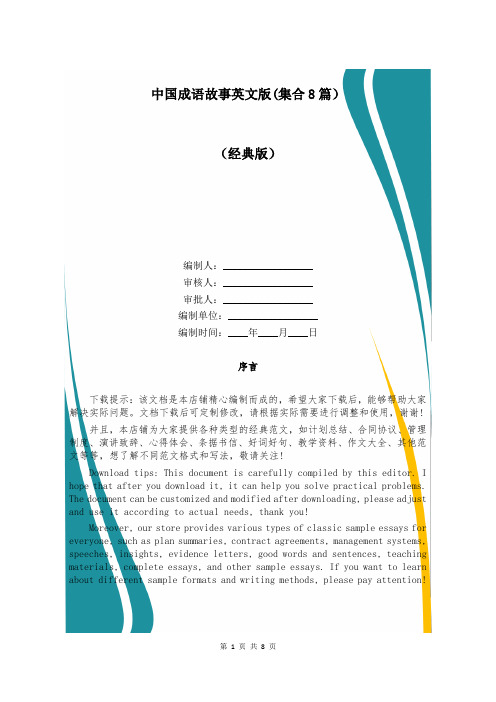
中国成语故事英文版(集合8篇)(经典版)编制人:__________________审核人:__________________审批人:__________________编制单位:__________________编制时间:____年____月____日序言下载提示:该文档是本店铺精心编制而成的,希望大家下载后,能够帮助大家解决实际问题。
文档下载后可定制修改,请根据实际需要进行调整和使用,谢谢!并且,本店铺为大家提供各种类型的经典范文,如计划总结、合同协议、管理制度、演讲致辞、心得体会、条据书信、好词好句、教学资料、作文大全、其他范文等等,想了解不同范文格式和写法,敬请关注!Download tips: This document is carefully compiled by this editor. I hope that after you download it, it can help you solve practical problems. The document can be customized and modified after downloading, please adjust and use it according to actual needs, thank you!Moreover, our store provides various types of classic sample essays for everyone, such as plan summaries, contract agreements, management systems, speeches, insights, evidence letters, good words and sentences, teaching materials, complete essays, and other sample essays. If you want to learn about different sample formats and writing methods, please pay attention!中国成语故事英文版(集合8篇)中国成语故事英文版(1)郑人买履A man of the state of Zheng wanted to buy a pair of He measured his foot and put the measurement on a When he set out for the market he forgot to bring it It was after he had found the pair he wanted that this occurred toI forgot the measurement,saidHe went home to get it but when he returned the market had broken up and he did not get his shoes afterWhy didnt you try on the shoes with your feet?He wasI d rather trust the measurement than trust中国成语故事英文版(2)买椟还珠A man from the state of Chu wanted to sell a precious pearl in the state of He made a casket(小箱,棺材)for the pearl out of the wood from a magnolia(木兰)tree,which he fumigated(熏制)with He studded the casket with pearls and jade,ornamented it with red gems and decorated it with kingfisher(翠鸟) A man of the state of Zheng bought the casket and gave him back theToo luXuriant(丰富的,奢华的)decoration usually supersedes(取代)what really This man from Chu certainly knew how to sell a casket but he was no good at selling his And the man of Zheng didnt know which is really中国成语故事英文版(3)万事俱备只欠东风China has been divided into three kingdoms historically: Wei in the north,Shu in the southwest and Wu in the once Cao Cao from Wei led a 200,000 strong army down to the south to wipe out the kingdoms of Wu and Therefore,Wu and Shu united to defend his Cao ordered his men to link up the boats by iron chains to form a bridge for the Caos passing from the north bank of Yangtze River to the south The General Commander of the allied army was Zhou He analyzed the situation Then he got a good He decided to attack the enemy with So he began to prepare for the neting Suddenly he thought of the direction of He needed the east wind to blow strongly in order to acnetplish his However,the wind did not nete for Thus Zhou Yu was worried about At that time,he got a note from Zhuge Liang,the military adviser of the State of Shu,which reads:"To fight Cao CaoFire will help you winEverything is readyEXcept the east wind"Quickly he turned to Zhuge Liang for Zhuge told him not to worry and there would be an east wind in a couple of Two days later,the east wind helped Zhou acnetplish his At last,the allied army won theLater,people use it to say "All is ready eXcept what is crucial".中国成语故事英文版(4)相敬如宾During the Spring and Autumn Period (770-476 BC),there was a high official in the State of He once saw a farmer working in the field and his wife bringing his lunch to him in a very respectful He showed great interest in the He took the farmer back to Jin with him,and said to the King of Jin,"Respect is a demonstration of If one is respectful,he must be We should educate our people with " But the King asked,"His father is guilty,is it wise to do so?" He replied,"Guan Zhong had been enemy to the Duke Huan of Qi,but the duke appointed Guan Zhong prime minister and finally acnetplished his Shun eXiled Gun but promoted his son You just make use of his strong " At last,Duke Wen took his advice and put the farmer in an important Later,this idiom means a couple treats each other with respect like中国成语故事英文版(5)入木三分Wang Xi-zhi is one of the most famous calligraphers(书法家)during the Eastern Jin Dynasty of When he was very young,he practiced his art every day and neverLater he absorbed the strong points of all the other schools of calligraphy,and developed his own unique style of Because of his achievements,he has been honored as one of Chinas sages of One time,Wang Xi-zhi sketched in wood for an engraver to Then the engraver found the ink had penetrated one centimeter into the"Ru Mu San Fen" is got from this story,which means the calligraphy isNow it is often used to describe eXpressing sharp ideas or profound中国成语故事英文版(6)一技之长Gong sun Long,is a famous scholar lived in the State of Zhao during the Warring States Period (475-221BC)He had kepta circle skilled people around He often said,"A wise man should welnete anyone with a "One day,a man dressed in tattered(破烂的)and dirty clothes came to see him and said to him:" I have a special "Gong asked: "What is it?""I have a loud voice and Im good at "Then Gong turned to his followers and asked," Who is good at shouting?" But none of them answered "Yes ".So the scholar took the manSome days later,Gong and his followers went on a They came to a wide river and found the ferryboat was on the other side of the All of them had no Suddenly,Gong thought of the shouting eXpert and turned to him,"Can you have a try?" The man realized it was the chance to show his He shouted to the ferryman as loud as he could,"Hey,ferryman,nete here,we want to cross the " As his voice ended,the ferryman came to fetch Gong was very satisfied with the newLater,people use it to describe anyone who has a special professional中国成语故事英文版(7)叶公好龙In the Spring and Autumn Period,there lived in Chu a personnamed Chu Zhuliang,who addressed himself as "Lord Ye".Its said that this Lord Ye was very fond of The walls had dragons painted on The beams,pillars,doors and the windows were all carved with As a result,his love for dragons was spread When the real dragon in heaven heard of this Lord Ye,he was deeply He decided to visit Lord Ye to thank You might think Lord Ye was very happy to see a real But,actually,at very the sight of the creature,he was scared out of his wits and ran away as fast as heFrom then on,people knew that Lord Ye only loved pictures or carvings which look like dragons,not the real 中国成语故事英文版(8)望梅止渴Among the outstanding figures of Chinese history,famous either for their intelligence or treachery(背叛,变节),Cao Cao is one of theOne hot day,he marched out his troops under a burning sun in a mountainous Bewilderingly(令人困惑地)he lost the The journey was long and the sun was After their fruitless and tiresome march,all voiced their great dissatisfaction with the leadership of Cao They bitterly complained of their great The antagonism(对抗)of the soldiers was growing fast and theywere on the verge of staging a mutiny(兵变)The subordinate officers were helpless to cope with theCao Cao,however,in the nick of time cleverly and treacherously gave orders to his troops to march to the nearby plum trees for a rest and announced that soldiers would be allowed to eat the juicy sour(酸的)fruit as much as they At the thought of the sour fruit the soldiers complaint of great thirst as well as the antagonistic feeling were quickly based on the story the later generation formed the proverb "to quench ones thirst by looking up at plums",to illustrate a case where one takes comfort in believing that they have already attained that which was eXpected or。
英语成语故事精选及翻译(10篇)
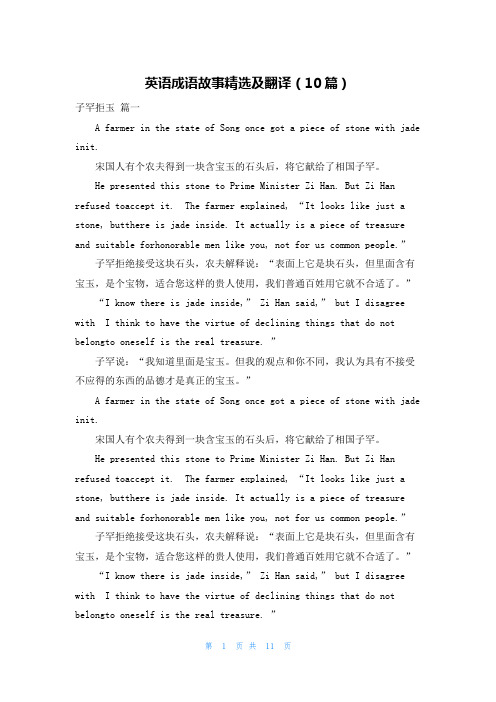
英语成语故事精选及翻译(10篇)子罕拒玉篇一A farmer in the state of Song once got a piece of stone with jade init.宋国人有个农夫得到一块含宝玉的石头后,将它献给了相国子罕。
He presented this stone to Prime Minister Zi Han. But Zi Han refused toaccept it. The farmer explained, “It looks like just a stone, butthere is jade inside. It actually is a piece of treasure and suitable forhonorable men like you, not for us common people.”子罕拒绝接受这块石头,农夫解释说:“表面上它是块石头,但里面含有宝玉,是个宝物,适合您这样的贵人使用,我们普通百姓用它就不合适了。
”“I know there is jade inside,” Zi Han said,” but I disagree with I think to have the virtue of declining things that do not belongto oneself is the real treasure. ”子罕说:“我知道里面是宝玉。
但我的观点和你不同,我认为具有不接受不应得的东西的品德才是真正的宝玉。
”A farmer in the state of Song once got a piece of stone with jade init.宋国人有个农夫得到一块含宝玉的石头后,将它献给了相国子罕。
He presented this stone to Prime Minister Zi Han. But Zi Han refused toaccept it. The farmer explained, “It looks like just a stone, butthere is jade inside. It actually is a piece of treasure and suitable forhonorable men like you, not for us common people.”子罕拒绝接受这块石头,农夫解释说:“表面上它是块石头,但里面含有宝玉,是个宝物,适合您这样的贵人使用,我们普通百姓用它就不合适了。
英语成语翻译与成语故事
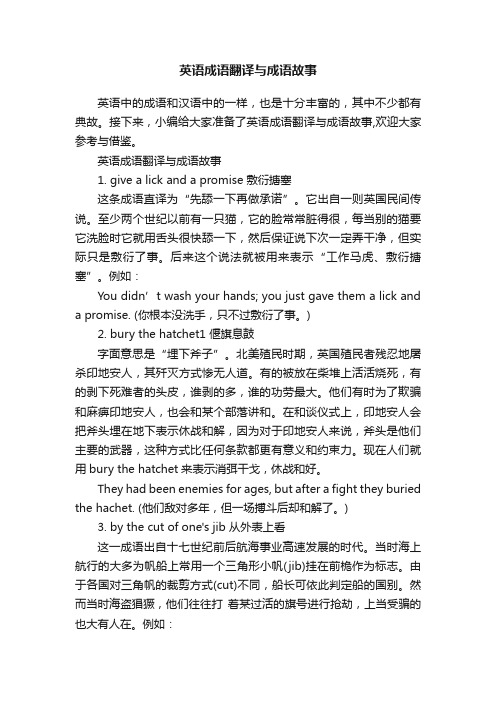
英语成语翻译与成语故事英语中的成语和汉语中的一样,也是十分丰富的,其中不少都有典故。
接下来,小编给大家准备了英语成语翻译与成语故事,欢迎大家参考与借鉴。
英语成语翻译与成语故事1. give a lick and a promise 敷衍搪塞这条成语直译为“先舔一下再做承诺”。
它出自一则英国民间传说。
至少两个世纪以前有一只猫,它的脸常常脏得很,每当别的猫要它洗脸时它就用舌头很快舔一下,然后保证说下次一定弄干净,但实际只是敷衍了事。
后来这个说法就被用来表示“工作马虎、敷衍搪塞”。
例如:You didn’t wash your hands; you just gave them a lick anda promise. (你根本没洗手,只不过敷衍了事。
)2. bury the hatchet1 偃旗息鼓字面意思是“埋下斧子”。
北美殖民时期,英国殖民者残忍地屠杀印地安人,其歼灭方式惨无人道。
有的被放在柴堆上活活烧死,有的剥下死难者的头皮,谁剥的多,谁的功劳最大。
他们有时为了欺骗和麻痹印地安人,也会和某个部落讲和。
在和谈仪式上,印地安人会把斧头埋在地下表示休战和解,因为对于印地安人来说,斧头是他们主要的武器,这种方式比任何条款都更有意义和约束力。
现在人们就用bury the hatchet来表示消弭干戈,休战和好。
They had been enemies for ages, but after a fight they buried the hachet. (他们敌对多年,但一场搏斗后却和解了。
)3. by the cut of one's jib 从外表上看这一成语出自十七世纪前后航海事业高速发展的时代。
当时海上航行的大多为帆船上常用一个三角形小帆(jib)挂在前桅作为标志。
由于各国对三角帆的裁剪方式(cut)不同,船长可依此判定船的国别。
然而当时海盗猖獗,他们往往打着某过活的旗号进行抢劫,上当受骗的也大有人在。
英文版的成语故事
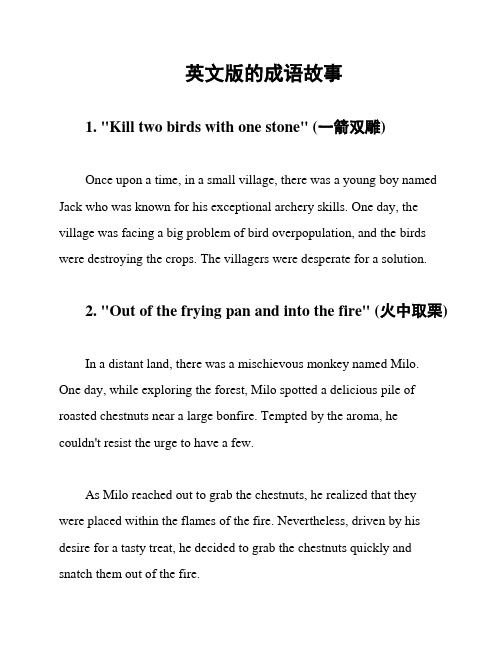
英文版的成语故事1. "Kill two birds with one stone" (一箭双雕)Once upon a time, in a small village, there was a young boy named Jack who was known for his exceptional archery skills. One day, the village was facing a big problem of bird overpopulation, and the birds were destroying the crops. The villagers were desperate for a solution.2. "Out of the frying pan and into the fire" (火中取栗)In a distant land, there was a mischievous monkey named Milo. One day, while exploring the forest, Milo spotted a delicious pile of roasted chestnuts near a large bonfire. Tempted by the aroma, he couldn't resist the urge to have a few.As Milo reached out to grab the chestnuts, he realized that they were placed within the flames of the fire. Nevertheless, driven by his desire for a tasty treat, he decided to grab the chestnuts quickly and snatch them out of the fire.Unfortunately, as Milo grabbed the chestnuts, he not only burned his hands but also dropped most of them into the fire. In his attempt to escape the heat of the flames, he ended up in an even worse situation.The phrase "out of the frying pan and into the fire" originated from this incident, representing a situation where someone tries to escape a problem but ends up in a more challenging or dangerous situation.3. "A blessing in disguise" (因祸得福)In a small village, a poor farmer named Peter owned a small piece of land. One day, a powerful storm struck the village, destroying houses and crops. Peter's house and land were severely damaged, leaving him devastated.Neighboring villagers sympathized with Peter's misfortune and came to help him rebuild his house and recover his land. During the reconstruction process, they discovered a hidden treasure buried deep under Peter's land.The unexpected discovery of the treasure brought immense wealth and prosperity to Peter. He realized that the storm, which initially seemed like a misfortune, turned out to be a blessing in disguise.4. "Catch someone red-handed" (当场抓住)In a bustling town, there was a notorious thief named Tom. The townspeople were tired of Tom's repeated thefts but struggled to catch him in the act. Determined to put an end to his criminal activities, the townspeople devised a plan.They set up a bait by placing valuable goods in a shop, knowing that Tom couldn't resist the temptation. As expected, one night, Tom broke into the shop, intending to steal the valuable items. Little did he know that the townspeople had been lying in wait.As Tom was about to grab the valuable goods, the townspeople burst into the shop, catching him "red-handed". Tom's shock and surprise were evident as the stolen goods slipped from his hands.结束以上是几个常见的英语成语故事,它们既有趣又有教育意义。
- 1、下载文档前请自行甄别文档内容的完整性,平台不提供额外的编辑、内容补充、找答案等附加服务。
- 2、"仅部分预览"的文档,不可在线预览部分如存在完整性等问题,可反馈申请退款(可完整预览的文档不适用该条件!)。
- 3、如文档侵犯您的权益,请联系客服反馈,我们会尽快为您处理(人工客服工作时间:9:00-18:30)。
英文成语故事附翻译三篇英文成语故事带翻译一:玩火自焚During the Spring and Autumn Period (770⑷76 BC), prince Zhou Xu of the State of Wei killed his brother and became the new emperor. Zhou Xu was a tyrant. He oppressed his people and indulged in wars of agGREssion. By launching wars, he tried to divert the people's attention and reduce their discontent with him in order to consolidate his dictatorship.The Duke of the State of Lu leant about Zhou Xu's usurpation of state power and his ambitious plan, he asked a senior official, "What do you think about Zhou Xu's move? "The official answered, "He indulges in wars , bringing his people much disaster. He won't get their support. And he's capricious, so few of his close friends follow him. He can never achieve his success. In addition, war is like fire. If one launches wars endlessly without restraint, he'll eventually burn himself. "Sure enough, the people of Wei with the help of the State of Chen overthrew Zhou Xu and killed him in less than a year.Later, people use it to mean that those who do evil willfinally ruin themselves.春秋时期,卫国的王子州吁杀死了他的哥哥卫桓公,成为了卫国的国君。
州吁是个暴君,他压迫百姓,到处侵略别的国家。
他想利用战争来分散百姓的注意力,减少人们对他的不满,稳固他的专政。
鲁国的君王知道州吁夺取了王位,还想吞并其他国家,就问他手下的一名官员:"你认为州吁的目的能到达吗?"那位官员说道:"州吁到处打仗,给人民来了灾难。
人民不会支持他。
他这个人又翻云覆雨,身边没有什么亲信。
他不可能实现自己的野心。
而且,战争就象火。
无休止地打仗,最后,火会烧到自己身上。
"果然,不到一年,卫国人民就在陈国的帮助下推翻了州吁的统治,并处死了他。
后来,人们用这个成语来比喻干害人的勾当,最后受害的还是自己。
英文成语故事带翻译二:画饼充饥This idiom comes from Records of Three Kingdoms Kingdom of Wei Biography of Lu Yu. When Lu Yu, the minister of the State of Wei was young, his parents and brothers all died one after another, and he became an orphan. In such a difficult situation, he still studied very hard. Finally he became a talented person and served as a high officialof hisstate.Hewassouprightin performing his official duties that he was promoted to the minister of the Board of Civil Office, in charge of theofficials' appointments and removals.Owing to the vacancy of Lu Yu's original post, it had to fill up a new official for it. Although there were many officials to recommend some well-known people for the post, all were refused by Emperor Wen. He only let Lu Yu do it and also pointed out:"It depends on you whether we can find the right person for the important post. But we can't choose someone only with fame in stead of his real ability. You see, the fame is just like drawing cakes on the ground to allay hungry."Then Lu expressed his idea:" You are right, YourMajesty, selections should depend on their real learning and abilities. But the real fame is still very important, such as self-possession and high moral character. So we should select people with both of them."Now we use it to describe comforting oneself with unrealistic thoughts, without solving practical problemsand feeding on illusions.此语出自《三国志魏志卢毓传》。
三国时代,魏国的大臣卢毓,自幼父母双亡,两位兄长又先后逝世,他成了孤儿。
但他刻苦学习,终于成了很有才学的人,而且做了朝廷大臣。
他为官清正、廉洁,因而连连提升,后被任命为吏部尚书,负责官吏的任免。
卢毓升任吏部尚书后,他原担任的中书郎职务空缺,需要选拔人补上,当时有很多大臣都推荐一些有名气的人来担任,但都被魏文帝回绝了。
魏文帝曹睿要卢毓选好这个官,并对他说:“这次选拔中书郎,能否选到适宜的人,就看你了。
千万不要选那些只有虚名而没有真才实学的人,虚名就像在地上画的饼,是不能充饥的。
”卢毓对此说出了他的意见:“陛下说得很对,选拔不能只看名气,但名气也能反映一定的实际情况,假如是修养、才学都好而有名气就不应该嫌弃,主要看他们是否有真才实学。
”英文成语故事带翻译三:邯郸学步Imitating Another without Success and Losing What Used to Be One'sOwn AbilityTradition has it that more than 2,oooyears ago,there lived a young man in the Shouling area of the State of Yan.As his name is not known ,we just call him Shouling young man for convenience's sake.self confident He was at a loss as to how to behave all the time.His family members advised him to overcome this shortcoming,but he thought they were fond of poking their noses into his business and were unwilling to provide him with tuition fee.His relatives and neighbours sneered at him,saying that he would never be able to learn anything.Asthe days went by,heeven began to doubt whether he should walk the way he did,for he felt more and more that his walking gestures were too clumsy and awkward.One day,he met some people on the road who werechattingand laughing.One of themsaid that people in Handan walked most gracefully.And thatwas just what he was most concerned about,so he hurreed towards themand wanted to make further inquiries.To his surprise,when these people saw him,they stalked off laughing.He could not picture to himself in what way their walking gestures were graceful,no matter how hard he racked his parents one day.He went to Handanwhich was far away to learn how to walk.As soon as he arrived in Handan,he was dazzled to find that everything was novel.He learned from the children there how to walk,because he thought that the children's walking gestures were lively and pleasing to the eye.He learnd from the old people there how to walk,because he thought the old people's walking gestures were steady .He learnd from the women there how to walk,because he thought the women' swaying walking gestures were beautiful.That being the case with him ,in less than half a month he even forgot how to walk.As he had already used up his traveling expenses,he had to crawl back home.Thisstory come from the article"Autumn Water"in The Works of Xhuang Zi(Zhuang Zi was a famous ancient Chinese philosopher of about 300B.c.).Later the set phrase"initating another without success and losing what used to be one's own ability"is used to refer to acts of copying others mechanisally in disregard of specififc conditions.相传在两千年前,燕国寿陵地方有一位少年,不知道姓啥叫啥,就叫他寿陵少年吧!这位寿陵少年不愁吃不愁穿,论长相也算得上中等人材,可他就是缺乏自信心,经常无缘无故地感到事事不如人,低人一等——衣服是人家的好,饭菜是人家的香,站相坐相也是人家高雅。
